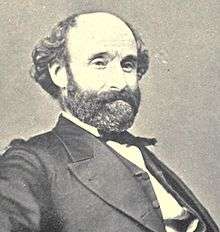Hamilton Ward Sr.
Hamilton Ward Sr. (July 3, 1829 in Salisbury, Herkimer County, New York – December 28, 1898 in Wellsville, Allegany County, New York) was an American lawyer and politician.

Biography
He attended the common schools and was privately tutored. He studied law in Elmira, New York, was admitted to the bar and commenced practice in Philipsville in 1851.
Beginning in 1858 Ward was regularly selected as a delegate to New York's Republican state conventions, and he attended almost every one until 1890.
He was District Attorney of Allegany County from 1856 to 1859 and again from 1862 to 1865. He was appointed in 1862 by the Governor of New York as commissioner to raise and equip troops for the Civil War.
Ward was elected as a Republican to the 39th, 40th and 41st United States Congresses, serving from March 4, 1865 to March 3, 1871. While a Representative, he was Chairman of the Committee on Revolutionary Claims (Fortieth Congress). Ward also drafted the articles of impeachment against President Andrew Johnson in 1868. He was not a candidate for renomination to the House in 1870.
Ward was New York State Attorney General from 1880 to 1881, elected in 1879.
He was a delegate to the New York State Constitutional Convention of 1890, and was appointed (and subsequently elected) a justice of the New York Supreme Court and served from 1891 to 1895, and in the Appellate Division from 1895 until his death in 1898.
He was buried at the Forest Hill Cemetery in Belmont.
His son Hamilton Ward Jr. also was New York Attorney General (1929–1930).
Sources
- United States Congress. "Hamilton Ward Sr. (id: W000133)". Biographical Directory of the United States Congress.
- Obituary in the New York Times on December 29, 1898
External links
| U.S. House of Representatives | ||
|---|---|---|
| Preceded by Robert B. Van Valkenburgh |
Member of the U.S. House of Representatives from New York's 27th congressional district 1865–1871 |
Succeeded by Horace B. Smith |
| Legal offices | ||
| Preceded by Augustus Schoonmaker Jr. |
New York Attorney General 1880–1881 |
Succeeded by Leslie W. Russell |